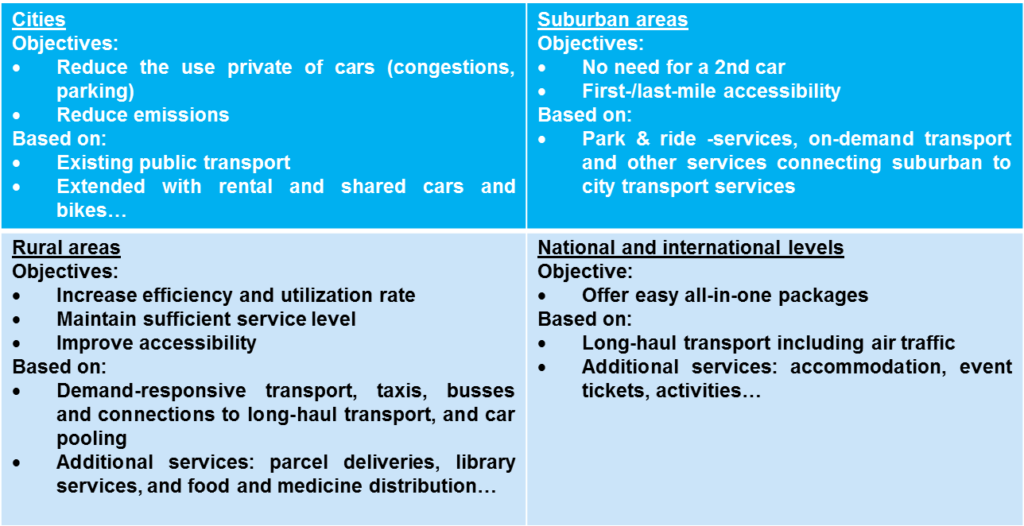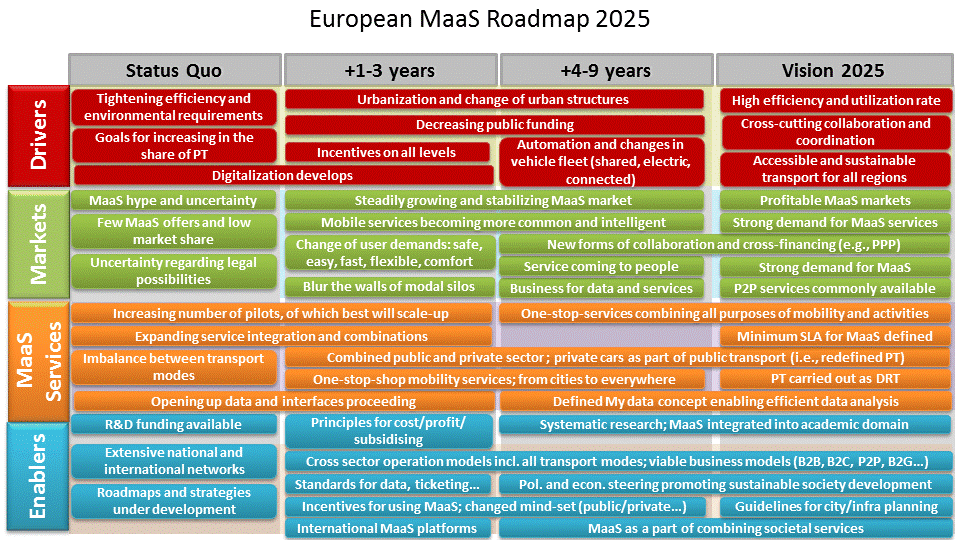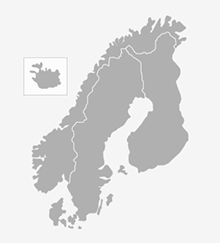The MAASiFiE project (Mobility As A Service For Linking Europe, 2015-2017) funded by CEDR aimed at identifying and analysing MaaS business models and service combinations. Also impact assessment and technological aspects of MaaS were studied. The main expected result was the Roadmap 2025 for MaaS in Europe.
![]()
MaaS was defined by the MAASiFiE project (2016) as follows: “Multimodal and sustainable mobility services addressing customers’ transport needs by integrating planning and payment on a one-stop-shop principle”. Even though all the MaaS services have similar main characteristic , e.g. one-stop-shop principle, mobile ticketing and payment, and multimodal planner and (re)routing, the objectives and the basis of MaaS services vary in different geographical context.

MaaS in different geographical context (Eckhardt & Aapaoja 2016)
Project method
The project was conducted by interviews, surveys, a literature study and a series of four workshops. The first three workshops created national MaaS visions, evaluated potential impacts of Maas based on national Maas cases and created national Roadmap 2025 defining short and medium-tern actions and requirements to reach the visions. These workshops were organised similarly in Finland, Sweden and Austria. In addition an international workshop was organised creating European Roadmap 2025, consolidating results and defining next steps in implementing MaaS.
MaaS Roadmap
European MaaS Roadmap 2025 defines short (1-3 years) and medium-term (4-9 years) actions and transition needed to reach the vision formed in the first MAASiFiE workshops. The Roadmap is divided into four functional perspectives: drivers, markets, MaaS services and enablers. The full Roadmap presented in MAASiFiE Deliverable 2 considers each perspective from the following viewpoints: academy and R&D, business, policy & regulation, technology & data, and social & culture. The simplified European MaaS Roadmap 2025 is presented below.
Academy and R&D is seen as an enabler for identifying best practices, conducting impact assessment, and developing living lab test environments. Business sector affects mainly market, MaaS services and acts as an enabler. Business is considered responsible e.g. for creating new pilots and services, collaboration and new business models, and developing one-stop-shop principle. Policy & regulation covers all functional perspectives creating an environment enabling and promoting interoperability, collaboration, MaaS ecosystem and achievement of policy targets. Key enabling technologies for MaaS exist, but challenges are related to e.g. interoperability and open interfaces, privacy and standardization. Social and culture aspects are related to e.g. market and MaaS services. MaaS is expected to solve the life puzzle from mobility perspective. Consumers can influence the MaaS development by positive user acceptance and attitude, as well as becoming prosumers (producer/ consumer) by integrating e.g. private cars to the MaaS ecosystem.

European MaaS Roadmap 2025 (Eckhardt, Aapaoja, Nykänen, Sochor, Karlsson & König 2017)
Next steps
MaaS is still in its early stage and many uncertainties exist, e.g. which business models will succeed, what will be the impacts of MaaS, and will MaaS become a big success or not. More pilots and services are needed, and benchmarking of best practices. Evaluation and quantitative data is required to identify the real impacts of MaaS. Also MaaS roadmap needs to be updated in the near future to see the direction where MaaS is heading.
More information on the project can be found from the project website, including the project deliverables.
 Contact:
Contact:
Jenni Eckhardt
jenni.eckhardt@vtt.fi
VTT, Finland






Follow us: